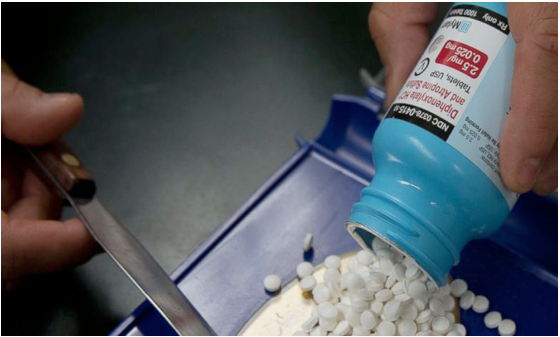CommentsGELFAND’S WORLD--The pharmaceutical industry sued the state of California on Friday. You see, California recently passed a law that would require the drug companies to give advance warning before they raise prices substantially. Under California's new law, drug companies are at least supposed to provide some advance notice and to explain their reasons. So as night follows day, the pharmaceutical industry filed suit, wrapping themselves in the Constitution and various other sacred obligations.
As the above linked article explains, the pharma folks claimed:
"The law creates bureaucracy, thwarts private market competition, and ignores the role of insurers, pharmacy benefit managers and hospitals in what patients pay for their medicines,' James Stansel, PhRMA's executive vice president and chief counsel, said in a statement Friday."
 It's that part about "thwarts private market competition" that gets me. Put it this way -- PhRMA representative James Stansel should be very careful about standing where lightning could strike down from the heavens.
It's that part about "thwarts private market competition" that gets me. Put it this way -- PhRMA representative James Stansel should be very careful about standing where lightning could strike down from the heavens.
Let's expand:
A series of investigations makes clear that the major pharmaceutical companies are not engaging in a lot of competition. A report from Blue Cross/Blue Shield explains the reality. Note: This article is fairly long, but well worth reading if you want to understand the dynamics of drug pricing. Here is one excerpt:
"Over the seven-year study period, a limited number of patent-protected prescription drugs have driven the entire year-over-year increase in drug costs. Generics have only managed to offset the cost growth of these patented drugs by taking an increasing share of total prescriptions. Despite generics accounting for 82 percent of all prescriptions in 2016, patented drugs account for 63 percent of total spending."
In other words, the drugs that are still on patent -- though a minority of actual prescriptions -- account for the majority of payments. That's because the newer drugs are extraordinarily expensive. Even some drugs out of patent such as recombinant human insulin are rising in price rapidly.
The pricing of insulin is actually one of the best examples of the trend, as explained by an article in Business Insider:
"In most industries, competition drives down prices. But the market for insulin looks more like airline tickets. When one company raises the price, the others quickly follow. And in some cases the companies even seem to increase prices simultaneously."
As the article shows, Lilly's short acting insulin Humalog and Novo Nordisk's Novolog do essentially the same thing and would theoretically be in competition with each other. But the two drugs have tracked each other in price so closely over the past 20 years that the curves essentially overlap. During that time, the price has increased about ten fold. What used to cost $25 is now over $250. There is a similar overlap in prices for the longer acting insulin formulations Levemir (Novo Nordisk) and Lantus (Sanofi). Notice that insulin is not a new invention or even a new product. It has been in use in medicine for nearly a hundred years.
We can all remember other price increases that became public scandals in the recent past. Martin Shkreli went to jail for an unrelated offense, but he became notorious for raising the price of a drug called Daraprim through the roof. There is another drug that most of us haven't heard of called H.P. Acthar. It is sold by Mallinckrodt, which recently raised the price to $34,000. The remarkable price increases are detailed in another Business Insider story.
When it comes to the pharmaceutical industry, market competition is for the other guy.
It's possible that some level of market competition could do something for the beleaguered health care consumer. We know it works in the realm of generic drugs (see the Blue Cross/Blue Shield summary linked above). But what's missing in the equation is that market competition involves both sellers and buyers. In the United States, the Medicare administration is literally forbidden to bargain with manufacturers over the price of drugs. That erases one side of the equation.
This raises another issue -- really the crux of the matter -- that has seemingly disappeared from the healthcare debate. The United States spends a far larger fraction of its income on healthcare costs than any other major industrialized democracy. And we don't get anything more for the expenditure, as comparisons of life expectancy and well-being show. The major European countries deliver equal or better care for much less money.
What's really missing is a broader perspective which includes the ability of the government -- i.e.: the people as a whole through their elected representatives -- to bargain with drug companies and to regulate the healthcare industry.
The right wing has been somewhat effective in demonizing alternative systems (Canada, France, the U.K.) but their arguments fail when subjected to honest analysis.
Something is badly wrong. Bill Clinton singled out the economic damage done by our medical costs right at the beginning of his presidency. His attempts to deliver some sort of healthcare reform went down in flames, in spite of its obvious logic.
The rapid rise in drug prices may be just one symptom of an overall problem in American healthcare delivery, but it has unequal and fairly brutal effects on those unlucky individuals who have need of some particularly expensive drug. This represents a failure in our system of social insurance which is linked to our system (actually the lack of a well-integrated system) for delivering health care to those who need it.
The right wing scares its followers with the threat of the government taking over healthcare. It's a hollow argument when you consider that the current alternative is to have no pushback at all. The right wing pontificates about the free market as our savior, in spite of the fact that what we have is nothing resembling a free market. Ask an automobile accident victim being rushed to the hospital in an ambulance about how he plans to bargain with the emergency room over the cost of his care.
There aren't very many Americans who haven't heard at least one horror story about outrageous billings. With prescription drugs, those stories are becoming more the norm than the exception. It will be interesting to see how the drug industry's lawsuit pans out.
By the way, it's a common right wing trope that drug companies have to charge Americans high prices in order to maintain their level of research and innovation, in spite of the fact that modern European countries don't leave their people hung out to dry by extravagant drug prices. Nevertheless, I think it's fair to concede that there are legal problems that make things worse, not the least of them being the current system of patent protection, a serious hindrance to a more stable system of drug pricing. I think it's also fair to concede that it takes a long time to take a promising chemical and bring it to market as a drug, the average being close to a decade and the cost being in the hundreds of millions of dollars. There may be some way to shrink these impediments, but the tradeoff might well be in the loss of safety. Take notice if the Republican congress attempts to scale back the FDA's ability to regulate licensing of new drugs.
(Bob Gelfand writes on science, culture, and politics for CityWatch. He can be reached at [email protected])
-cw














